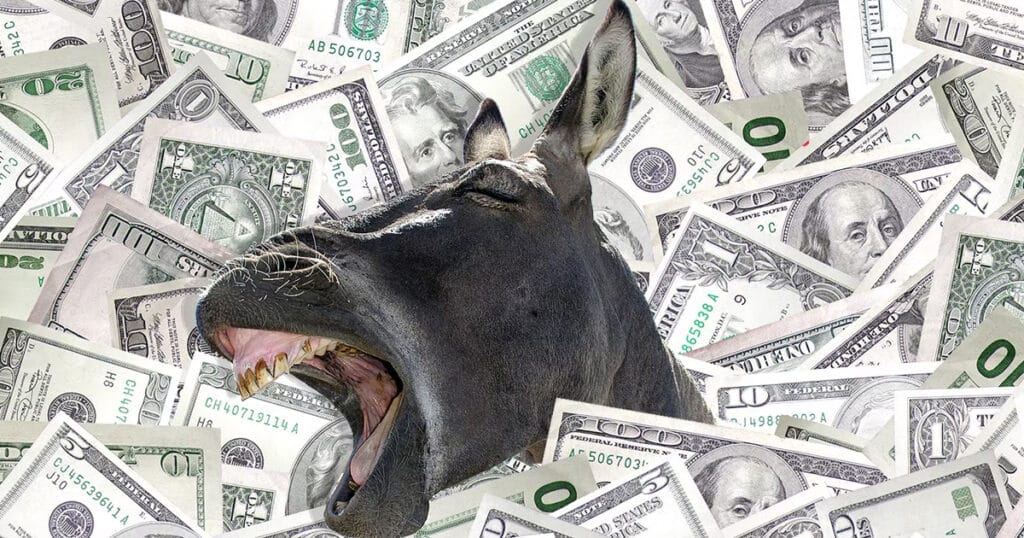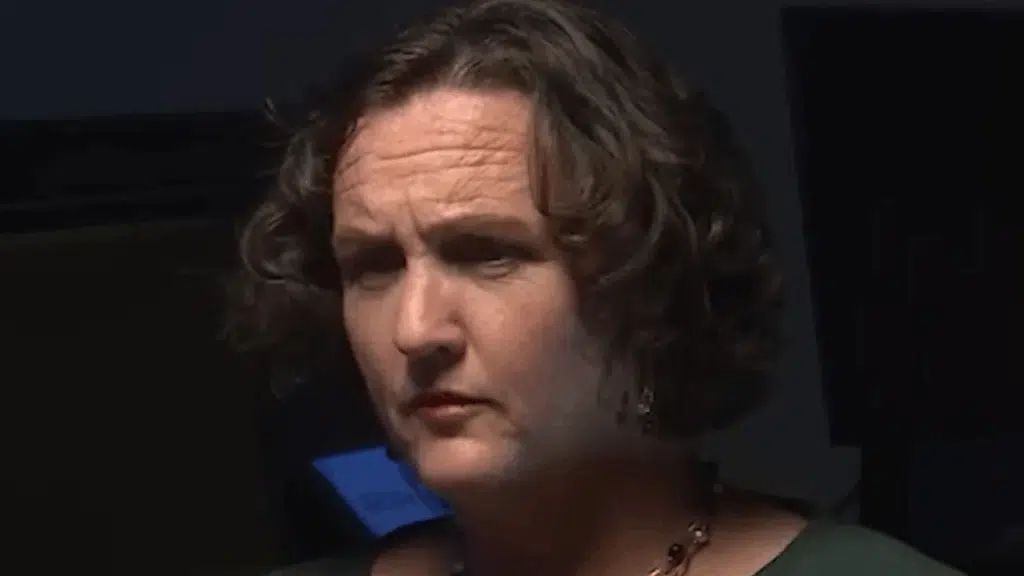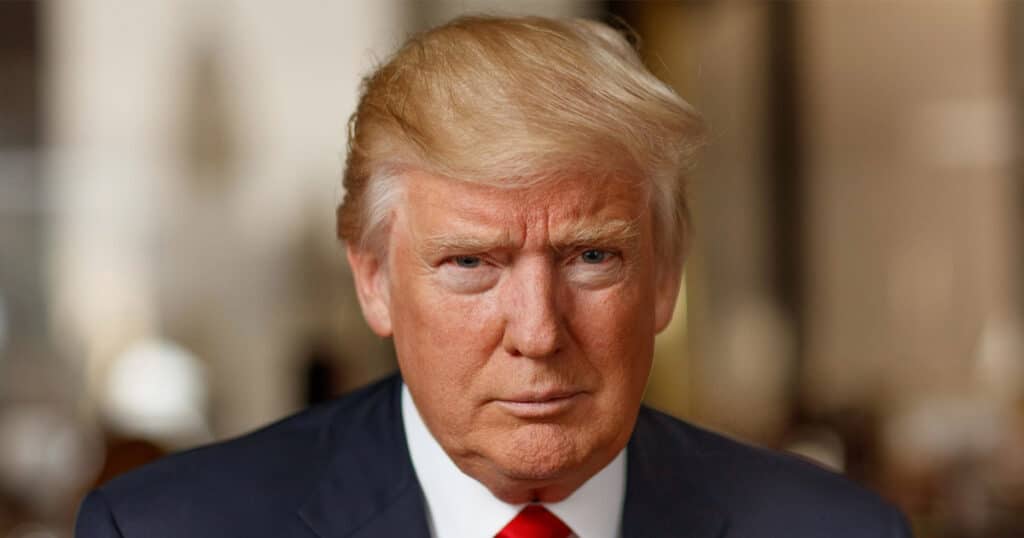
Democrats’ Dark-Money Devotion
Secretive liberal dark-money groups spent hundreds of millions of dollars to boost Democrats’ 2022 midterm ground game, pushing the limits of election law while helping to reduce an expected red Republican wave to little more than a ripple.
Still smarting from the underwhelming midterm results, some Republicans are calling on party leaders to replicate those turnout efforts on the right or risk continued disappointments at the ballot box. But doing so is no easy task, veteran GOP operatives argue, especially considering Democrats’ reliance on union foot soldiers for tactical operations, and the sheer magnitude of the money and complex infrastructure their side is devoting to the effort.
By mid-2021, the latest tax filings available, the nation’s largest liberal dark-money network had already raked in some $1.5 billion for the midterm elections. The final number is almost certainly much higher, as groups affiliated with Arabella Advisors, a D.C. consulting firm that works with a network of nonprofits bankrolling liberal and progressive causes, kept collecting and spending in the months leading up to the November midterms.
But beyond the overall figure these dark-money groups amassed, the tax filings show that a handful of well-funded liberal groups have channeled hundreds of millions of dollars into crucial ground-game efforts, such as voter registration drives in minority communities and final get-out-the-vote efforts.
The groups often use vague language in describing their activities to avoid triggering IRS rules that provide big tax exemptions as long as the work remains nonpartisan or abides by certain limits on its partisan work.
For instance, the Hopewell Fund, a 501(c)3 that is part of the Arabella network, reported spending $89 million in 2021 on civil rights advocacy and social actions, including “improving civic engagement among underrepresented groups.” The Sixteen Thirty Fund, a 501(c)4, which has greater legal latitude in conducting partisan turnout efforts, said it spent $76.65 million in 2021 on a “broad array of projects” promoting “civil rights, social action, and advocacy” including “working to ensure voting access and civic participation.”
America Votes, a 501(c)4 group, is more straightforward about its focus on voter registration and turnout. One of its founders, Steven Rosenthal, a veteran Democratic operative who spent several years as political director of the AFL-CIO, previously launched Americans Coming Together, or ACT, a voter mobilization project aimed at defeating GOP President George W. Bush in 2004. Even though it failed in that mission, ACT spent more than $142 million and built one of the largest Democratic turnout operations in history.
In creating America Votes, Rosenthal teamed up with Ellen Malcolm of EMILY’s List, a group devoted to electing pro-choice Democratic women, and Carl Pope, the Sierra Club’s executive director. According to its website, America Votes collaborates with more than 400 state and national partner organizations across the left, including the AFL-CIO, League of Conservation Voters, and NARAL Pro-Choice America, to coordinate “voter engagement and mobilization” efforts.
The group’s latest IRS tax filing from mid-2021, which was released late last year, shows it collected a whopping $245 million and spent $132 million “to advance progressive policies, expand access to the ballot, coordinate issue advance and protect every American’s right to vote.” It also reported spending $92.6 million “to coordinate election campaigns.”
Though its website claims that it carries out “non-partisan, education-focused programs,” America Votes is a key part of a powerful network of dark-money groups that often share funds and work together to benefit Democrats.
For instance, in 2020, the Sixteen Thirty Fund granted $129 million to America Votes, accounting for more than 50% of its revenue and the behemoth’s largest beneficiary that year. Last summer, just months ahead of the midterms, Majority Forward, a dark-money super PAC aligned with Senate Majority Leader Chuck Schumer and other Democratic Senate leaders, gave $32 million to America Votes, according to the Center for Responsive Politics, a non-partisan election reform group.
Just weeks before the November midterms, America Votes faced scrutiny for sending mailers in Nevada pressuring the recipient to vote, with reminders that voter turnout history is public record, a practice known as vote-shaming.
“We will be reviewing public records after the election to determine whether or not you joined your neighbors in voting,” the mailer said, along with a reference to the upcoming election on Tuesday, Nov. 8.
It’s hard to say just how effective such heavy-handed tactics were, but the mailers didn’t come cheap. And Democrats, especially in heavily unionized states such as Nevada, benefit from a naturally aligned volunteer army of union members who can follow up with more traditional get-out-the-vote tactics, such as phone calls, texting, and door-knocking.
In Nevada, Republicans saw mixed results. Popular Clark County Sheriff Joe Lombardo defeated incumbent Democratic Gov. Steve Sisolak by 4,000 votes, while Adam Laxalt, the GOP Senate candidate, lost by fewer than 8,000 votes statewide, a margin of less than 1%, against incumbent Democrat Sen. Catherine Cortez Masto.
Both parties benefit from dozens of these nonprofit dark-money groups, which amass unlimited sums from billionaires or unions and don’t have to disclose the identity of the donors if they abide by specific election laws. Campaign finance reformers and many Democrats who support restrictions on political fundraising have long railed against the practice, at least when Republicans were leading the way.
For years, Democrats such as Sen. Sheldon Whitehouse have denounced these “shadowy” GOP-aligned groups funded by the U.S. Chamber of Commerce and the billionaire Koch brothers for collecting and spending unlimited funds without disclosing where the money came from. In the Democratic presidential primary, several Democratic White House hopefuls, notably Vermont Sen. Bernie Sanders and Pete Buttigieg, promised either not to boost their candidacies through spending by outside groups with cash from secret wealthy donors or at least to disclose the big donors and the role they played in the campaign.
But in 2020, Democrats outpaced Republicans in raising and spending dark money, with anonymous donors pouring record amounts of money into groups to send Joe Biden to the White House, the Center for Responsive Politics and other media investigations found.
After a disappointing 2022 midterm showing, the tables have turned. Republicans are now grousing that they are being far-outspent and out-maneuvered by these opaque groups when it comes to get-out-the-vote efforts, an increasingly important aspect of modern campaigning since states have ushered in more early voting and flexible mail-in voting laws during and after the COVID pandemic.
“Buried in tax forms, you’ll see billions in dark money have been spent propping up extremist politicians, radically transforming election laws, and shoring up voter turnout,” Caitlin Sutherland, executive director for Americans for Public Trust, a conservative watchdog group, told RealClearPolitics. “And one network is behind it all: Arabella Advisors. This dark money machine has perfected the art of weaponizing grassroots voter contact and backroom D.C. deals to an unprecedented level not seen on the right.”
The 2022 midterm election returns told the tale. A wave of envelopes containing mail-in ballots boosted Democratic candidates to victories in several key Nov. 8 races, preventing Republicans from winning the Senate majority and limiting the red tide to a trickle in the House, where the GOP won the majority by a slim margin.
In the aftermath of the election, many Republican officials and party activists have alternately blamed Donald Trump for undermining trust in the early voting systems, poor candidates he backed, party leaders’ decisions on spending, and Democrats’ advantage in the small-dollar money chase.
Others have complained that Republican dark-money super PACs are relying too heavily on television ad spending to make their case to voters instead of channeling more funds into improving tactical operations. Another source of resentment: High-paid Washington political consultants generally get a cut of funds devoted to television, radio, and digital ads, while there’s far less money to be made in labor-intensive ground-game operations.
Recriminations have ramped up in some GOP circles ahead of a contested election challenging Ronna McDaniel as head of the Republican National Committee. The RNC chairmanship election will be decided at the party’s winter meeting later this month.
McDaniel appears to have the backing she needs to win, but a vocal group of dissenters has questioned the logic of keeping her at the RNC helm after the underwhelming midterm results. Shortly after the election, McDaniel released an open letter showing endorsements from more than 100 committee members out of 168. But her main opponent, Harmeet Dhillon, a GOP lawyer and California committeewoman, has continued the attack, arguing that a major shake-up is needed to change how the party operates, including far more focus on the ground game.
On her campaign website, Dhillon argues that Republicans “must recognize that [the] RNC is one of a constellation of institutions we need on our side.”
“We cannot compare our fundraising to the DNC,” she stated. “The DNC isn’t where their game is. Their game is in dark money and billionaires banking their money in nonprofits and a host of other institutions.”
“We are not keeping up,” she warned. “We must create our own creative infrastructure geared toward winning.” In a recent appearance on Fox News, Dhillon assailed the RNC for a myriad of problems.
“I think if we acknowledge our failures, tighten our belts, stop wasting donor money, focus like a laser on making sure that we actually get people’s ballots into the ballot boxes … and finally, cut out the middlemen of consultants who are running Congress and running the Republican National Committee, we will be so far ahead,” she said.
The RNC has tried to counter by touting McDaniel’s turnout efforts, including encouraging Republicans to vote early and by absentee ballot. RNC spokesman Nathan Brand told RCP that the “RNC ground game” contacted 83% of registered Republicans who voted early in person and 78% of registered Republicans who absentee voted. He said that volunteers working on behalf of the RNC made 22 million more voter contacts than any previous midterm cycle. “The RNC was successful in engaging Republican voters nationwide to turn out early, via absentee or on Election Day,” Brand said.
But several veteran GOP operatives who spoke to RCP have blamed the party committees – the RNC and the National Republican Senatorial Committee – for spending too much early in the campaign and running out of funds for an effective turnout machine in the critical final weeks.
Other GOP election experts pointed out that the RNC is legally barred from coordinating with outside groups so it’s the wrong entity to blame for Republicans’ failure to match Democrats’ dark-money ground-game operations.
“Some people who don’t have a clear grasp of some of the campaign finance rules have criticized the RNC for not coordinating some of these outside groups,” Charlie Spies, a veteran GOP election lawyer, told RCP. “The RNC is legally prohibited … from coordinating the activities of outside money groups. This is an effort that has to come from conservative leaders and from groups outside the actual party structure.”
Spies asserts that it’s easier for Democrats to fund and target such voter registration and GOTV efforts because of heavily Democratic urban areas, as well as the vast union resources they have at their disposal.
Spies also argued that Democrats are pushing the boundaries of their dark-money groups’ tax-exempt statuses but benefit from anti-GOP bias within the IRS and the Justice Department. “I think they act in an aggressive way that if conservative-leaning groups did, they would have IRS and DOJ investigations” coming after them, he asserted.
Steve Sampson, a spokesman for Arabella Advisors, demonstrated how carefully his group and others must walk to avoid federal legal action. He stressed that Arabella is not an umbrella group for related allied liberal dark-money groups, instead describing its role as a “service provider.”
“While Sixteen Thirty Fund and Hopewell are both clients of Arabella, they hire us to provide back-office operational, [human resources] and compliance services,” he said in an emailed statement. “We do not make programmatic or funding decisions on their behalf. We never have.”
And while Amy Kurtz, president of the Sixteen Thirty Fund, touted her organization’s midterm activities, she declined to divulge how much of its revenue was devoted to ground-game efforts. (Some nonprofit organizations are permitted to funnel money into partisan politics, but this is not supposed to be their main activity.)
Kurtz also defended the group’s financial support of America Votes’ efforts “to expand voting access in states like Nevada, Michigan, and Wisconsin” and vowed to keep up the efforts in future elections.
“We also invested in increasing turnout in communities of color and activating the youth vote,” she noted. “Our projects and grantees did great work in the lead-up to the 2022 midterms, but the threats to our democracy and coordinated campaign to suppress voting remain, and Sixteen Thirty Fund will maintain our focus on these important issues.”
This article was originally published by RealClearPolitics and made available via RealClearWire.


